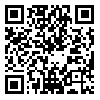Volume 14, Issue 6 (9-2014)
Iranian Journal of Medical Education 2014, 14(6): 438-494 |
Back to browse issues page
Download citation:
BibTeX | RIS | EndNote | Medlars | ProCite | Reference Manager | RefWorks
Send citation to:



BibTeX | RIS | EndNote | Medlars | ProCite | Reference Manager | RefWorks
Send citation to:
Heydari A, Shokouhi Targhi E. The Effect of an Educational-Orientation Program Upon Professional Self-Concept of Undergraduate Nursing Students. Iranian Journal of Medical Education 2014; 14 (6) :438-494
URL: http://ijme.mui.ac.ir/article-1-3057-en.html
URL: http://ijme.mui.ac.ir/article-1-3057-en.html
()M.Sc. Candidate of Nursing, School of Nursing and Midwifery, Mashhad University of Medical Sciences, Mashhad, Iran. Email: shokouhie@yahoo.com , shokouhie@yahoo.com
Abstract: (13808 Views)
Introduction: Professional self-concept is the individual's perception of self as a professional person and it affects his/her thinking, role development, and professional function. In recent years, improving self-concept has been discussed as a global aim in higher education, especially in nursing discipline. Thus, this study was conducted to examine the effect of an educational-orientation program on professional self-concept of bachelor nursing students.
Methods: Through an experimental study in 2011-2012 academic years, 50 bachelor nursing students of Mashhad University of Medical Sciences were selected and randomly assigned into experimental and control groups. Study subjects in two groups completed the study questionnaires before the educational program, at the end, and three weeks after the intervention. The control group just received the usual training of nursing courses and the experimental group participated in six sessions of educational-orientation program, weekly. Data was analzed using T test,ANOVA with repeated measures and two-way ANOVA.
Results: According to the findings, a significant difference was observed between the average scores of nursing self-concept before intervention (169.5±26), immediately after the intervention (178.4±22.6), and three weeks after the intervention (184.4±25.6) in the experimental group out of 216 (P≤0.003) this is while this difference was not statistically significant in control group (P=0.651). So, the educational-orientation program had increased the average self-concept score in experimental group. Also the maximal changes in professional self-concept aspects were observed in the general self-concept dimension.
Conclusion: The educational-orientation programs that are organized with given objectives for professional development of nursing students and represent a positive picture of nursing profession can improve professional self-concept of nursing students
Keywords: Self-concept, nursing self-concept, professional self-concept, nursing students, educational-orientation program, nursing.
Type of Study: Original research article |
Subject:
Teaching Methods
Received: 2013/12/31 | Accepted: 2014/08/5 | Published: 2014/09/2 | ePublished: 2014/09/2
Received: 2013/12/31 | Accepted: 2014/08/5 | Published: 2014/09/2 | ePublished: 2014/09/2
پرسشنامه مطالعه [DOCX 17 KB] (339 Download)
پرسشنامه مطالعه 2 [DOCX 12 KB] (288 Download)
Send email to the article author
| Rights and permissions | |
 |
This work is licensed under a Creative Commons Attribution-NonCommercial 4.0 International License. |




